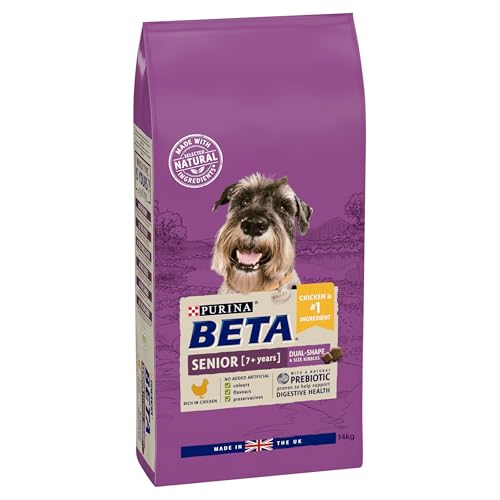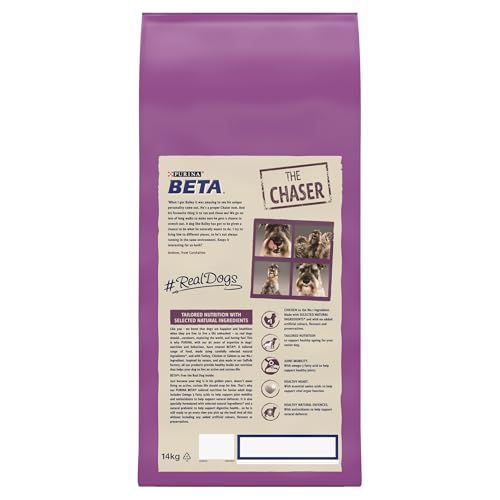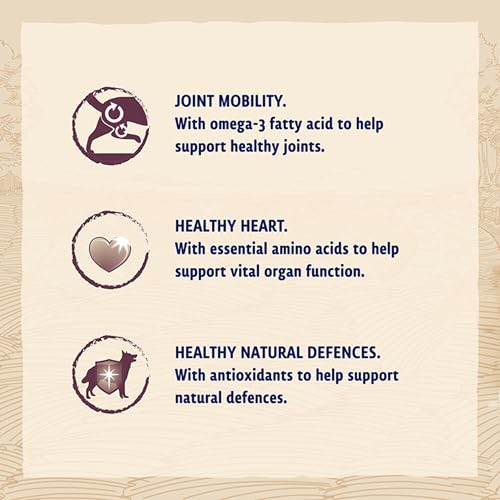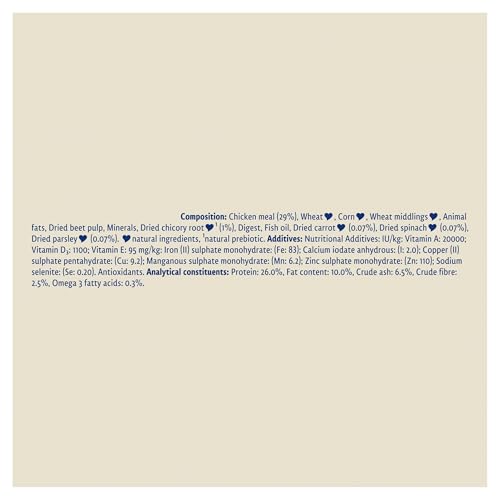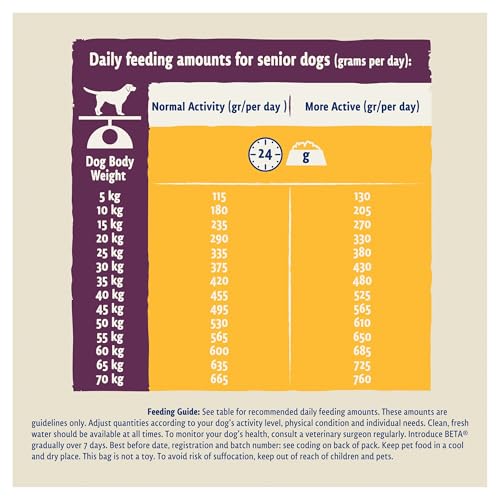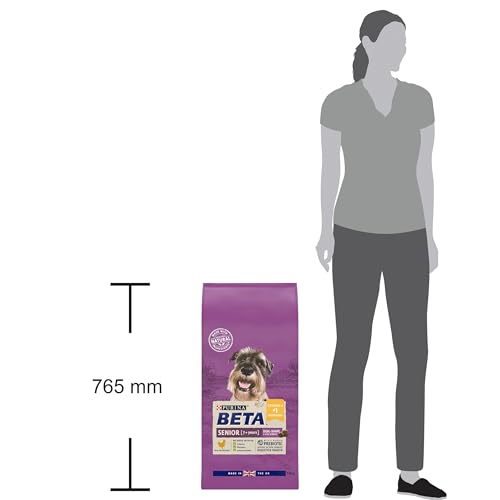
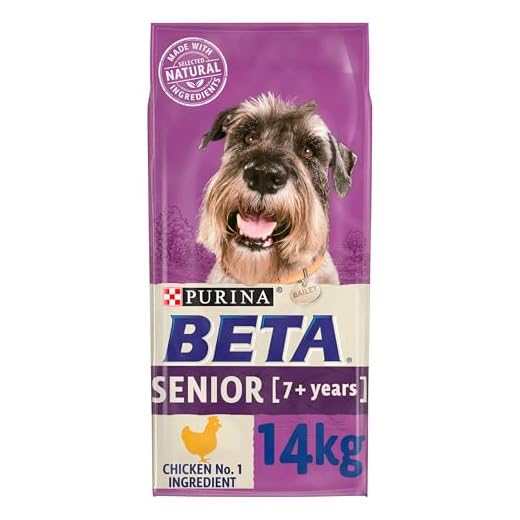



As a devoted dog owner, I know how heart-wrenching it can be to watch our beloved companions age and struggle with maintaining a healthy weight. Older dogs often face a variety of challenges, from decreased appetite to medical conditions that make it difficult for them to gain and retain weight. In my quest to ensure my senior dog lives a comfortable and healthy life, I have explored numerous options to find the best dog food specifically designed to help older dogs gain weight.
Through personal experience and extensive research, I’ve discovered that not all dog foods are created equal, especially when it comes to addressing the unique nutritional needs of senior dogs. It’s crucial to choose a diet that not only boosts their caloric intake but also provides the essential nutrients that support their overall health. Factors such as protein quality, fat content, and the inclusion of beneficial supplements play a significant role in finding the right food for older dogs who need to gain weight.
In this article, I’ll share my insights on the best dog food options for older dogs needing to gain weight. I’ll delve into the specific ingredients to look for, the brands that have proven effective, and tips on how to encourage your senior dog to eat more. By understanding what to feed our ageing companions, we can help them maintain a healthy weight, enhance their quality of life, and enjoy their golden years to the fullest.
Understanding the Nutritional Needs of Older Dogs
As our beloved dogs age, their dietary requirements evolve significantly. It’s crucial to adjust their nutrition to cater to these changes, ensuring they remain healthy and active in their senior years. Older dogs often face challenges such as reduced metabolic rate, decreased muscle mass, and potential dental issues, all of which necessitate a tailored diet.
One of the primary concerns with senior dogs is their ability to maintain a healthy weight. Unlike younger dogs, older pets may struggle to gain weight due to a decrease in appetite or digestive efficiency. This is why it’s essential to choose foods that are not only high in quality but also specifically formulated to meet the unique needs of an ageing canine.
Key Nutritional Considerations
- Protein: High-quality protein is vital for maintaining muscle mass, which tends to diminish as dogs age. Opt for foods with lean protein sources to support their muscle health without adding unnecessary fat.
- Fats: Healthy fats are important for providing energy and supporting skin and coat health. Look for foods that include omega-3 and omega-6 fatty acids, which can also help with inflammation and joint health.
- Fibre: Increased fibre can aid in digestion and help with any gastrointestinal issues that older dogs might face. It also assists in managing weight by promoting a feeling of fullness.
- Vitamins and Minerals: Senior dogs require an enhanced intake of certain vitamins and minerals to support their overall health. Ingredients like glucosamine and chondroitin are beneficial for joint health, while antioxidants can boost their immune system.
- Palatability: As dogs age, they may become pickier eaters. Ensuring the food is palatable and easy to chew can help encourage consistent eating habits.
Understanding these nutritional needs and making informed choices about your dog’s diet can significantly improve their quality of life. Regular consultations with your veterinarian can provide additional guidance tailored to your pet’s specific health needs and conditions.
Incorporating these dietary adjustments can help your senior dog gain and maintain a healthy weight, ensuring they continue to thrive in their golden years.
Key Ingredients for Enhancing Weight in Senior Dogs
As our canine companions age, their nutritional needs change, often requiring adjustments to their diet to maintain a healthy weight. If your older dog is struggling to keep weight on, it’s important to look for specific ingredients in their food that can help them gain and maintain a healthy weight. Understanding these key components can make a significant difference in your dog’s health and well-being.
When selecting food for an older dog that needs to gain weight, it’s crucial to choose products that offer high-quality protein, healthy fats, and easily digestible carbohydrates. These ingredients not only support weight gain but also contribute to overall health, ensuring your senior dog remains active and happy.
Essential Ingredients for Weight Gain
- High-Quality Protein: Protein is vital for muscle maintenance and growth, especially in older dogs. Look for dog foods that list real meat, such as chicken, beef, or fish, as the first ingredient. These sources provide essential amino acids that support muscle health and weight gain.
- Healthy Fats: Fats are a dense source of calories and are essential for skin and coat health. Ingredients like chicken fat, fish oil, and flaxseed oil are excellent sources of healthy fats. Omega-3 and Omega-6 fatty acids, found in these ingredients, also have anti-inflammatory properties that benefit aging dogs.
- Easily Digestible Carbohydrates: Senior dogs often need easily digestible carbohydrates to provide quick energy without causing digestive issues. Ingredients such as sweet potatoes, brown rice, and oats are great options. They provide necessary fibre and nutrients while being gentle on the digestive system.
- Vitamins and Minerals: A balanced diet for older dogs should include essential vitamins and minerals that support their overall health. Look for foods fortified with vitamins E and C, which have antioxidant properties, as well as glucosamine and chondroitin, which support joint health.
- Probiotics and Prebiotics: These ingredients promote a healthy digestive system, which is crucial for nutrient absorption. Ingredients like chicory root extract and dried fermentation products can help maintain gut health and improve your dog’s ability to gain weight.
Ensuring that these ingredients are present in your senior dog’s food can help them gain the necessary weight while supporting their overall health. Always consult with your veterinarian before making any significant changes to your dog’s diet, especially for older pets with specific health concerns.
Best Commercial Dog Food Brands for Senior Dogs to Gain Weight
As our beloved canine companions age, they often face a variety of health challenges, including difficulty maintaining a healthy weight. Ensuring that senior dogs receive proper nutrition is essential for their overall well-being and longevity. Finding the right commercial dog food that can help older dogs gain weight while also meeting their unique nutritional needs can be a daunting task.
Over the years, I’ve researched and tried numerous brands to find the best options that cater specifically to the needs of senior dogs. Below, I’ll share some of the top-rated commercial dog food brands that have proven effective in helping senior dogs gain weight. These options provide balanced nutrition and include ingredients that support joint health, digestion, and overall vitality.
Recommended Brands for Senior Dogs
When selecting food for an older dog, it’s crucial to consider formulas that are rich in high-quality proteins and healthy fats. Here are some brands that have consistently stood out:
-
Hill’s Science Diet Senior – Known for its scientific approach to pet nutrition, Hill’s Science Diet offers a formula specifically for older dogs. This food is designed to promote lean muscle and is rich in antioxidants and vitamins to support overall health.
-
Blue Buffalo Life Protection Formula Senior – This brand includes high-quality protein sources and is fortified with glucosamine and chondroitin to support joint health. The formula also contains LifeSource Bits, a precise blend of antioxidants, vitamins, and minerals.
-
Nutro Ultra Senior – Nutro Ultra’s senior formula is crafted with a trio of high-quality proteins from chicken, lamb, and salmon, along with a superfood blend that provides essential nutrients. It’s designed to keep older dogs active and healthy.
-
Merrick Grain-Free Senior – This grain-free option is packed with deboned chicken and sweet potatoes, offering a high protein and fat content to help with weight gain. It also includes omega fatty acids to promote a healthy coat and skin.
Choosing the right food can make a significant difference in your senior dog’s health and happiness. Always consult with your veterinarian before making any dietary changes to ensure the chosen food aligns with your dog’s specific health needs and conditions. With the right nutrition, your older dog can maintain a healthy weight and enjoy their golden years to the fullest.
Homemade Recipes for Helping Older Dogs Gain Weight
As our furry companions age, maintaining a healthy weight can become a challenge. I’ve found that homemade meals can be a wonderful way to ensure older dogs not only gain the needed weight but also receive the right nutrition tailored to their specific needs. Crafting these meals at home gives me control over the ingredients, ensuring they are fresh and nutritious.
When creating homemade recipes for my senior dog, I focus on incorporating high-quality proteins, healthy fats, and easily digestible carbohydrates. These components are essential for promoting weight gain while supporting overall health. Below, I’ve shared a few of my favourite recipes that have worked wonders for my older dog’s weight and wellbeing.
High-Protein Chicken and Rice
This recipe is a great starting point as it’s both nutritious and easy to digest. Here’s how I prepare it:
- Ingredients:
- 1 cup of cooked chicken breast, shredded
- 1/2 cup of brown rice, cooked
- 1/2 cup of cooked sweet potato, mashed
- 1 tablespoon of olive oil
- 1/4 cup of chicken broth (low sodium)
- Instructions:
- Mix the shredded chicken, cooked brown rice, and mashed sweet potato in a large bowl.
- Drizzle the olive oil over the mixture and stir to combine.
- Add the chicken broth to moisten the mixture and ensure it’s easy for your dog to eat.
- Serve in small portions, storing the remainder in the refrigerator for up to three days.
Beef and Veggie Feast
This hearty meal provides a good balance of protein and vitamins. Here’s my go-to recipe:
- Ingredients:
- 1 cup of lean ground beef, cooked
- 1/2 cup of quinoa, cooked
- 1/2 cup of chopped carrots, steamed
- 1/4 cup of green peas, steamed
- 1 tablespoon of flaxseed oil
- Instructions:
- Combine the cooked ground beef, quinoa, carrots, and peas in a large bowl.
- Add the flaxseed oil and mix thoroughly.
- Allow the mixture to cool to room temperature before serving.
- Store any leftovers in an airtight container in the refrigerator for up to three days.
Salmon and Potato Delight
Salmon is an excellent source of healthy fats and protein, perfect for older dogs needing to gain weight. Here’s how I make it:
- Ingredients:
- 1 cup of cooked salmon, flaked
- 1/2 cup of boiled potatoes, mashed
- 1/4 cup of plain yoghurt (unsweetened and unflavoured)
- 1 tablespoon of coconut oil
- 1/4 cup of chopped spinach, lightly steamed
- Instructions:
- Mix the flaked salmon and mashed potatoes in a bowl.
- Add the yoghurt and coconut oil, stirring until well combined.
- Gently fold in the steamed spinach.
- Let the mixture cool slightly before serving.
- Keep any remaining portions in the refrigerator for up to two days.
By preparing these meals at home, I can ensure that my older dog receives the necessary nutrients to gain weight healthily. These recipes are not only nutritious but also delicious, making mealtime something my dog looks forward to every day.
Feeding Tips and Schedules for Senior Dogs
As our furry companions age, their nutritional needs evolve. Ensuring that senior dogs receive the right diet is crucial for maintaining their health and helping them stay active and happy. I’ve found that tailoring the feeding schedule and making thoughtful choices about their diet can make a significant difference.
Older dogs often face challenges like reduced metabolism and dental issues, which can impact their ability to gain weight. Adjusting their diet to address these issues involves selecting nutrient-rich, easily digestible foods and following a consistent feeding routine.
Effective Feeding Tips
To support an older dog’s weight gain and overall health, consider these key strategies:
- Smaller, Frequent Meals: Instead of feeding large meals once or twice a day, opt for smaller portions more frequently. This can help improve digestion and nutrient absorption.
- High-Quality Proteins: Choose dog foods that are rich in high-quality proteins, such as chicken, fish, or lamb. Proteins are essential for maintaining muscle mass, which can prevent weight loss.
- Calorie-Dense Foods: Look for foods that are high in calories but easy to digest. This ensures that even if your dog eats smaller portions, they still get the necessary energy.
- Moist or Wet Foods: If your senior dog has dental issues, wet or moist foods can be easier to chew and more palatable.
- Supplements: Consider adding supplements like omega-3 fatty acids or glucosamine to their diet to support joint health and overall well-being.
Establishing a Feeding Schedule
Consistency is key when feeding senior dogs. Here’s a recommended feeding schedule to help them gain weight effectively:
- Morning Feeding: Start the day with a small meal rich in protein and calories. This can help kickstart their metabolism and provide energy for the day.
- Mid-Morning Snack: Offer a light snack, such as a small portion of wet food or a protein-rich treat, to keep their energy levels stable.
- Afternoon Meal: Provide another balanced meal in the early afternoon. This should be similar in composition to the morning meal.
- Evening Snack: A second light snack can help maintain energy levels before the final meal of the day.
- Nighttime Feeding: Conclude with a small but nutritious meal. This helps ensure they don’t go too long without food overnight, which can aid in weight gain.
By implementing these feeding tips and schedules, you can help your senior dog maintain a healthy weight and improve their quality of life. Remember, always consult with your veterinarian before making significant changes to your pet’s diet to ensure it meets their specific health needs.
Monitoring Weight Gain and Health in Older Dogs
As your dog ages, ensuring they maintain a healthy weight becomes increasingly important. Older dogs may struggle with various health issues that can affect their weight, such as reduced appetite, dental problems, or underlying medical conditions. Therefore, it’s essential to monitor their weight gain closely and make adjustments as needed.
Regularly checking your dog’s weight and overall health will help you catch any potential problems early. It’s not just about seeing the number on the scale increase; it’s about ensuring that weight gain is a result of healthy habits and good nutrition.
Steps for Monitoring Weight Gain
- Regular Weigh-Ins: Weigh your dog every 1-2 weeks to track their progress. Use the same scale and weigh at the same time of day for consistency.
- Body Condition Scoring: Use a body condition score (BCS) chart to assess your dog’s body fat and muscle condition. This helps to determine if the weight gain is healthy.
- Diet Adjustments: Based on weight and health assessments, adjust your dog’s diet as necessary. Consult with your vet before making significant changes.
- Regular Vet Check-Ups: Schedule regular visits to your vet to monitor your dog’s overall health and address any concerns early.
It’s crucial to remember that weight gain should be gradual and steady. Rapid weight gain can lead to additional health problems, such as joint issues or heart disease. Patience and consistency are key to helping your older dog gain weight healthily.
In conclusion, monitoring your older dog’s weight and health involves regular check-ups, proper diet adjustments, and ongoing assessments of their body condition. By staying vigilant and responsive to your dog’s needs, you can help ensure they live a healthier, happier life in their senior years.
Best Dog Food For Older Dogs To Gain Weight
Features
| Part Number | 502000 |
| Model | 502000 |
| Release Date | 2019-12-23T00:00:01Z |
| Size | 14 kg (Pack of 1) |
Features
| Part Number | 12231689 |
| Model | 12531980 |
| Color | transparent |
| Release Date | 2014-05-23T00:00:01Z |
| Size | 1 count (Pack of 1) |
Features
| Part Number | 10753 |
| Model | 10753 |
| Size | 10 kg (Pack of 1) |
| Language | French |
Features
| Size | 500 g (Pack of 20) |
Features
| Part Number | 12231684 |
| Model | 12530962 |
| Color | transparent |
| Release Date | 2014-05-23T00:00:01Z |
| Size | 1 count (Pack of 1) |
| Price history for Beta Sensitive Dog Food with Salmon, 14kg | |
|---|---|
|
Latest updates:
|
|
Features
| Size | 500 g (Pack of 42) |
Q&A:
What is the best dog food for older dogs to gain weight?
The best dog food for older dogs to gain weight is one that is high in protein and healthy fats. Look for brands that include real meat as the first ingredient, such as chicken, beef, or fish. Additionally, ensure the food contains a balanced mix of carbohydrates, vitamins, and minerals to support overall health. Consult your vet for specific recommendations tailored to your dog’s needs.
How can I help my senior dog gain weight safely?
To help your senior dog gain weight safely, start by feeding them high-quality, nutrient-dense food that is appropriate for their age and health condition. Smaller, more frequent meals can also be beneficial. Supplements like fish oil or digestive enzymes can aid in nutrient absorption. Always consult your vet before making significant changes to your dog’s diet or adding supplements, to ensure the changes are safe and effective for your pet.









